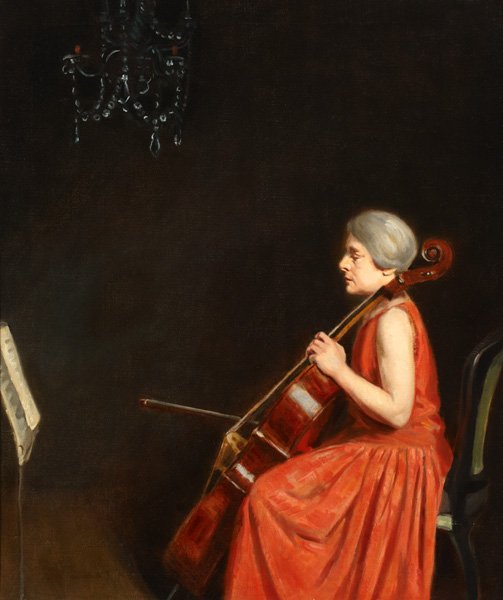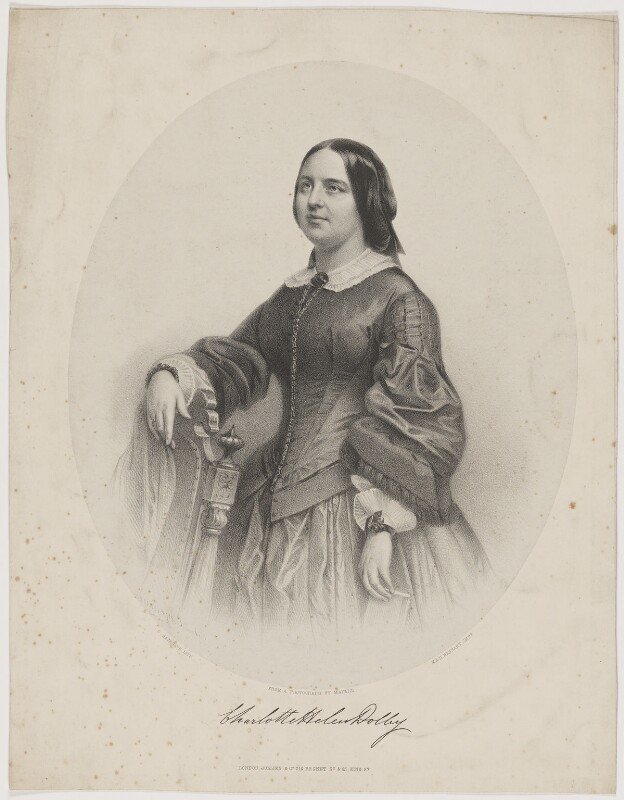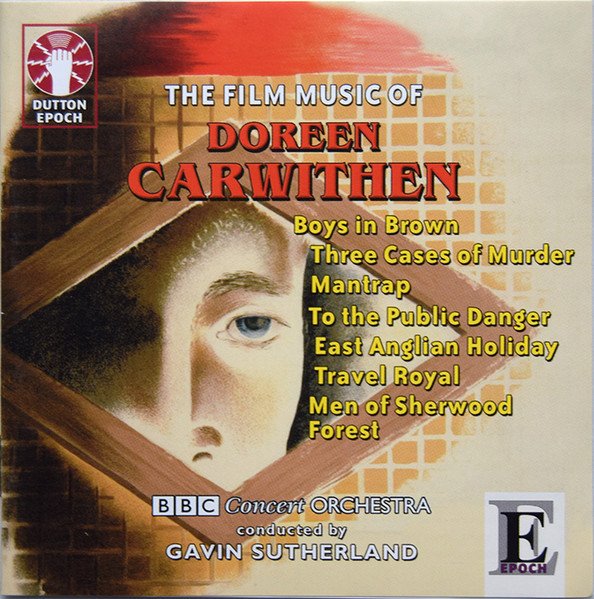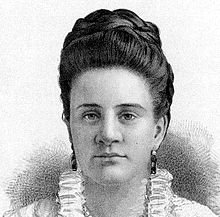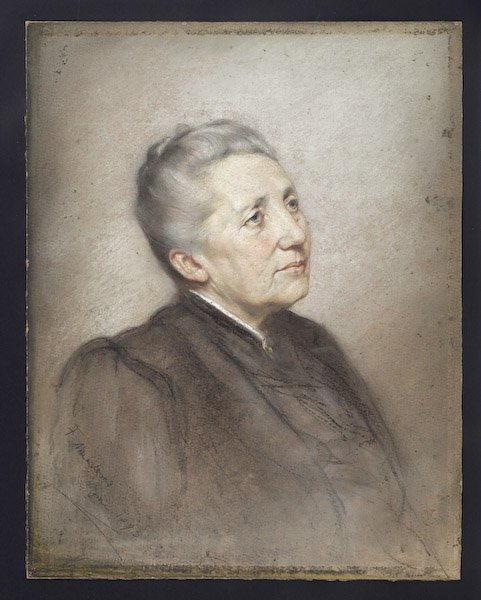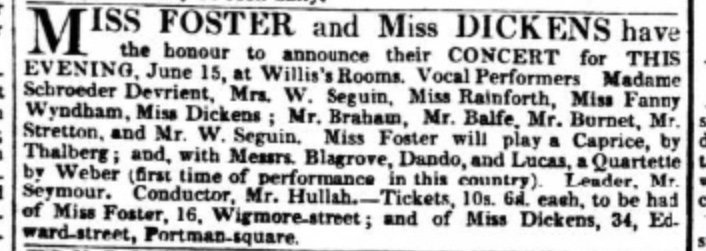Helen Hay Whitney: With Music
“Dear, did we meet in some dim yesterday?
I half remember how the birds were mute
Among green leaves and tulip-tinted fruit,
And on the grass, beside a stream, we lay
In early twilight; faintly, far away,
Came lovely sounds adrift from silver lute,
With answered echoes of an airy flute,
While Twilight waited tiptoe, fain to stay.
Her violet eyes were sweet with mystery.
You looked in mine, the music rose and fell
Like little, lisping laughter of the sea;
Our souls were barks, wind-wafted from the shore—
Gold cup, a rose, a ruby, who can tell?
Soft—music ceases—I recall no more.”
L.E.L.: The Improvatrice
“My childhood passed ‘mid radiant things,
Glorious as Hope’s imaginings ;
Statues but known from shapes of the earth,
By being too lovely for mortal birth ;
Paintings whose colours of life were caught
From the fairy tints in the rainbow wrought ;
Music whose sighs had a spell like those
That float on the sea at the evening’s close ;
Language so silvery, that every word
Was like the lute’s awakening chord ;
Skies half sunshine, and half starlight ;
Flowers whose lives were a breath of delight ;
Leaves whose green pomp knew no withering ;
Fountains bright as the skies of our spring ;
And songs whose wild and passionate line
Suited a soul of romance like mine.”
Alice Meynell: A Shattered Lute
“I touched the heart that loved me as a player
Touches a lyre. Content with my poor skill,
No touch save mine knew my beloved (and still
I thought at times: Is there no sweet lost air
Old loves could wake in him, I cannot share?).
O he alone, alone could so fulfil
My thoughts in sound to the measure of my will.
He is gone, and silence takes me unaware.
The songs I knew not he resumes, set free
From my constraining love, alas for me!
His part in our tune goes with him; my part
Is locked in me for ever; I stand as mute
As one with vigorous music in his heart
Whose fingers stray upon a shattered lute.”
Sara Teasdale: To A Castilian Song
“We held the book together timidly,
Whose antique music in an alien tongue
Once rose among the dew-drenched vines that hung
Beneath a high Castilian balcony.
I felt the lute strings’ ancient ecstasy,
And while he read, my love-filled heart was stung,
And throbbed, as where an ardent bird has clung
The branches tremble on a blossomed tree.
Oh lady for whose sake the song was made,
Laid long ago in some still cypress shade,
Divided from the man who longed for thee,
Here in a land whose name he never heard,
His song brought love as April brings the bird,
And not a breath divides my love from me!”
Hilda Doolittle: Cuckoo Song
“Ah, bird,
our love is never spent
with your clear note,
nor satiate our soul;
not song, not wail, not hurt,
but just a call summons us
with its simple top-note
and soft fall;
not to some rarer heaven
of lilies over-tall,
nor tuberose set against
some sun-lit wall,
but to a gracious
cedar-palace hall;
not marble set with purple
hung with roses and tall
sweet lilies– such
as the nightingale
would summon for us
with her wail–
(surely only unhappiness
could thrill
such a rich madrigal!)
not she, the nightingale
can fill our souls
with such a wistful joy as this:
nor, bird, so sweet
was ever a swallow note–
not hers, so perfect
with the wing of lazuli
and bright breast–
nor yet the oriole
filling with melody
from her fiery throat
some island-orchard
in a purple sea.
Ah dear, ah gentle bird,
you spread warm length
of crimson wool
and tinted woven stuff
for us to rest upon,
nor numb with ecstasy
nor drown with death:
only you soothe, make still
the throbbing of our brain:
so through her forest trees,
when all her hope was gone
and all her pain,
Calypso heard your call–
across the gathering drift
of burning cedar-wood,
across the low-set bed
of wandering parsley and violet,
when all her hope was dead.”
Elizabeth Bishop: I am in need of music
“I am in need of music that would flow
Over my fretful, feeling fingertips,
Over my bitter-tainted, trembling lips,
With melody, deep, clear, and liquid-slow.
Oh, for the healing swaying, old and low,
Of some song sung to rest the tired dead,
A song to fall like water on my head,
And over quivering limbs, dream flushed to glow!
There is a magic made by melody:
A spell of rest, and quiet breath, and cool
Heart, that sinks through fading colors deep
To the subaqueous stillness of the sea,
And floats forever in a moon-green pool,
Held in the arms of rhythm and of sleep.”
Willa Cather: The Encore
“No garlands in the winter time,
No trumpets in the night!
The song ye praise was done lang syne,
And was its own delight.
O’ God’s name take the wreath away,
Since now the music’s sped;
Ye never cry “Long live the king!”
Until the king is dead.
When I came piping through the land,
One morning in the spring,
With cockle burrs upon my coat,
’Twas then I was a king:
A mullein sceptre in my hand,
My order daisies three,
With song’s first freshness on my lips—
And then ye pitied me!”
Maya Angelou: Caged Bird
“A free bird leaps
on the back of the wind
and floats downstream
till the current ends
and dips his wing
in the orange sun rays
and dares to claim the sky.
But a bird that stalks
down his narrow cage
can seldom see through
his bars of rage
his wings are clipped and
his feet are tied
so he opens his throat to sing.
The caged bird sings
with a fearful trill
of things unknown
but longed for still
and his tune is heard
on the distant hill
for the caged bird
sings of freedom.
The free bird thinks of another breeze
and the trade winds soft through the sighing trees
and the fat worms waiting on a dawn bright lawn
and he names the sky his own.
But a caged bird stands on the grave of dreams
his shadow shouts on a nightmare scream
his wings are clipped and his feet are tied
so he opens his throat to sing.
The caged bird sings
with a fearful trill
of things unknown
but longed for still
and his tune is heard
on the distant hill
for the caged bird
sings of freedom.”
Edna St Vincent Millay: The Concert
“No, I will go alone.
I will come back when it’s over.
Yes, of course I love you.
No, it will not be long.
Why may you not come with me? —
You are too much my lover.
You would put yourself
Between me and song.
If I go alone,
Quiet and suavely clothed,
My body will die in its chair,
And over my head a flame,
A mind that is twice my own,
Will mark with icy mirth
The wise advance and retreat
Of armies without a country
Storming a nameless gate,
Hurling terrible javelins down
From the walls of a singing town
Where no women wait!
Armies clean of love and hate,
Marching lines of pitiless sound
Climbing hills to the sun and hurling
Golden spears to the ground!
Up the lines a silver runner
Bearing a banner whereon is scored
The milk and steel of a bloodless wound
Healed at length by the sword!
You and I have nothing to do with music.
We may not make of music a filigree frame,
Within which you and I,
Tenderly glad we came,
Sit smiling, hand in hand.
Come now, be content.
I will come back to you, I swear I will;
And you will know me still.
I shall be only a little taller
Than when I went.”
Lizette Woodworth Reese: A Violin at Dusk
“Stumble to silence, all you uneasy things,
That pack the day with bluster and with fret.
For here is music at each window set;
Here is a cup which drips with all the springs
That ever bud a cowslip flower; a roof
To shelter till the argent weathers break;
A candle with enough of light to make
My courage bright against each dark reproof.
A hand’s width of clear gold, unraveled out
The rosy sky, the little moon appears;
As they were splashed upon the paling red,
Vast, blurred, the village poplars lift about.
I think of young, lost things: of lilacs; tears;
I think of an old neighbor, long since dead. ”
Elizabeth Barrett Browning: Thou Hast Thy Calling
“Thou hast thy calling to some palace-floor,
Most gracious singer of high poems! where
The dancers will break footing, from the care
Of watching up thy pregnant lips for more.
And dost thou lift this house’s latch too poor
For hand of thine? and canst thou think and bear
To let thy music drop here unaware
In folds of golden fulness at my door?
Look up and see the casement broken in,
The bats and owlets builders in the roof!
My cricket chirps against thy mandolin.
Hush, call no echo up in further proof
Of desolation! there’s a voice within
That weeps … as thou must sing … alone, aloof.”
Emily Dickinson: Musicians wrestle everywhere
“Musicians wrestle everywhere
All day—among the crowded air
I hear the silver strife
And—walking—long before the morn
Such transport breaks upon the town
I think it that “New Life”!
If is not Bird—it has no nest
Nor “Band”—in brass and scarlet—drest
Nor Tamborin—nor Man
It is not Hymn from pulpit read
The “Morning Stars” the Treble led
On Time’s first Afternoon!
Some—say—it is “the Spheres”—at play!
Some say that bright Majority
Of vanished Dames—and Men!
Some—think it service in the place
Where we—with late—celestial face
Please God—shall Ascertain!”
Frances Cornford: For M.S. Singing Frühlingsglaube in 1945
“Here are the Schubert Lieder. Now begin.
First the accompaniment,
Heart-known and heaven-sent
And so divinely right
The inmost spirit laughs with sure delight.
And now the fountain of the melody.
To your forgiven fields I am entered in,
Spring of my adolescence, Spring of the world,
Where every secret lime-leaf is unfurled,
Where all’s made well again, yet more’s to be—
Then why this misery?
Because, O enemy alien heart, we fear
That you are lost on your demoniac shore,
And we deny that in your music—here
Is your unchanged, unchanging innocent core.”
Amy Lowell: Listening
“’T is you that are the music, not your song.
The song is but a door which, opening wide,
Lets forth the pent-up melody inside,
Your spirit’s harmony, which clear and strong
Sing but of you. Throughout your whole life long
Your songs, your thoughts, your doings, each divide
This perfect beauty; waves within a tide,
Or single notes amid a glorious throng.
The song of earth has many different chords;
Ocean has many moods and many tones
Yet always ocean. In the damp Spring woods
The painted trillium smiles, while crisp pine cones
Autumn alone can ripen. So is this
One music with a thousand cadences. ”
Sara Teasdale: Old Tunes
“As the waves of perfume, heliotrope, rose,
Float in the garden when no wind blows,
Come to us, go from us, whence no one knows;
So the old tunes float in my mind,
And go from me leaving no trace behind,
Like fragrance borne on the hush of the wind.
But in the instant the airs remain
I know the laughter and the pain
Of times that will not come again.
I try to catch at many a tune
Like petals of light fallen from the moon,
Broken and bright on a dark lagoon,
But they float away — for who can hold
Youth, or perfume or the moon’s gold?”
Ellen: Effie Afton
“Sweet star, of seraph brightness,
That for a transient day
Shed o’er our souls such lightness,
And then withdrew the ray!
O, with immortal lustre
Thou ‘rt sparkling brightly now
Amid the gems that cluster
Around Jehovah’s brow!
Yet many hearts are keeping
Lone vigils o’er thy grave,
Where all the hopes are sleeping
Which thy young promise gave.
The sleep which knows no waking
Hath closed thy sweet blue eyes,
And while our hearts are breaking
We glance toward the skies.
Ah! there a hope is given
That bids us dry the tear;
That bright star in the heaven,
With beams so wondrous clear;—
’Tis Ellen’s “distant Aidenn,”
Far in the realms above,
And those clear rays are laden
With her pure spirit’s love.”
The Reapers' Song: Susannah Moodie
“The harvest is nodding on valley and plain,
To the scythe and the sickle its treasures must yield;
Through sunshine and shower we have tended the grain;
’Tis ripe to our hand!—to the field—to the field!
If the sun on our labours too warmly should smile,
Why a horn of good ale shall the long hours beguile.
Then, a largess! a largess!—kind stranger, we pray,
We have toiled through the heat of the long summer day!
With his garland of poppies red August is here,
And the forest is losing its first tender green;
Pale Autumn will reap the last fruits of the year,
And Winter’s white mantle will cover the scene.
To the field!—to the field! whilst the Summer is ours
We will reap her ripe corn—we will cull her bright flowers.
Then, a largess! a largess! kind stranger, we pray,
For your sake we have toiled through the long summer day.
Ere the first blush of morning is red in the skies,
Ere the lark plumes his wing, or the dew drops are dry,
Ere the sun walks abroad, must the harvestman rise,
With stout heart, unwearied, the sickle to ply:
He exults in his strength, when the ale-horn is crown’d,
And the reapers’ glad shouts swell the echoes around.
Then, a largess! a largess!—kind stranger, we pray,
For your sake we have toiled through the long summer day!”
The Complaint of Fancy: Matilda Betham
“As, musing, late I sat reclin’d,
And waking dreams absorb’d my mind,
A damsel came, of various dyes,
Like painted Iris from the skies;
A purfled saffron was her vest,
And sweet gum-cistus form’d her crest;
In many a playful ring, her hair
Flew light and flossy in the air;
The mantle, blue and gold, she wore,
A rose of opals held before,
While, graceful in her fairy hand,
Appear’d a crimson-tufted wand,
Whose shade on every object threw
A glowing tint of roseate hue.
”Whence art thou, blooming nymph?” I cried,
And thus a tuneful voice replied:
”Men call me Fancy; at my shrine
Myriads confess my power divine;
There painters bend the willing knee,
And laurell’d poets sue to me:
For mine is every vivid ray,
Which partial Nature gave the day;
And, to the music of my song,
A thousand nameless charms belong.
”The friend of Happiness, I dwell
Belov’d alike in court or cell;
Where Glory lifts her ardent eye,
With hasty, kindred zeal I fly,
In sun-beams place the hero’s form,
And bid his arm command the storm;
On swelling clouds an altar raise,
And fan the tow’ring flame of praise.
”Oft, from the lorn enthusiast’s lyre,
My fingers strike etherial fire,
And give to sounds of piercing woe,
Extatic rapture’s fervent glow.
Oft sooth the maniac’s throbbing vein,
And grace her simple, wilder’d strain;
The tribe of Pain in fetters keep,
Lull wounded Memory to sleep,
And, in the mind of gloomy Care,
Bid Thought an angel’s semblance wear.
”Dear to each blest aerial pow’r,
E’en Wisdom calls me to her bow’r;
My songs her leisure hours beguile,
And teach her holy lip to smile.
And, when the Muse, with thoughtful care,
Has woven chaplets for her hair,
I let her, with her myrtles, twine,
Full many a fragrant rose of mine.
”Then why, since all the wise and gay,
To me a grateful homage pay,
Since I to all my hand extend,
And, liberal, every heart befriend,
Does Nancy from the croud retire,
And rend my blossoms from her lyre?
Though every string the loss bewail,
And tones of mellow sweetness fail,
Which us’d to charm the pensive ear,
When list’ning Friendship bent to hear.
”Tell her I wish not to intrude
Upon her sacred solitude,
Nor cast my undulating chain,
Around her glowing heart again;
No! every claim I now resign,
Yet let some small regard be mine;
Let one, who nurs’d her infant years,
And wip’d away some bitter tears,
Still animate the scenes around,
And make her tread on fairy ground;
Give playful sweetness to each lay,
And decorate the passing day.
”Tell her, if now she scorns my strain,
She may invoke my name in vain;
In vain my proffered aid implore,
Contemn’d, I hardly pardon more.”
She said, and springing from the earth,
Attending found her suitor Mirth,
Who caught her hand, with lively air,
And plac’d her in his silver chair,
Which through the yielding ether flew,
And quickly bore them from my view.”
Fog: Louise Guiney
“Like bodiless water passing in a sigh,
Through palsied streets the fatal shadows flow,
And in their sharp disastrous undertow
Suck in the morning sun, and all the sky.
The towery vista sinks upon the eye,
As if it heard the horns of Jericho,
Black and dissolved; nor could the founders know
How what was built so bright should daily die.
Thy mood with man’s is broken and blent in,
City of Stains! and ache of thought doth drown
The generous light in which thy life began.
Great as thy dole is, smirchèd with his sin,
Greater and elder yet the love of man
Full in thy look, though the dark visor’s down.”
Thought-Magnets: Ella Wheeler Wilcox
“With each strong thought, with every earnest longing
For aught thou deemest needful to thy soul,
Invisible vast forces are set thronging
Between thee and that goal.
’Tis only when some hidden weakness alters
And changes thy desire, or makes it less,
That this mysterious army ever falters
Or stops short of success.
Thought is a magnet; and the longed-for pleasure
Or boon, or aim, or object, is the steel;
And its attainment hangs but on the measure
Of what thy soul can feel.”
